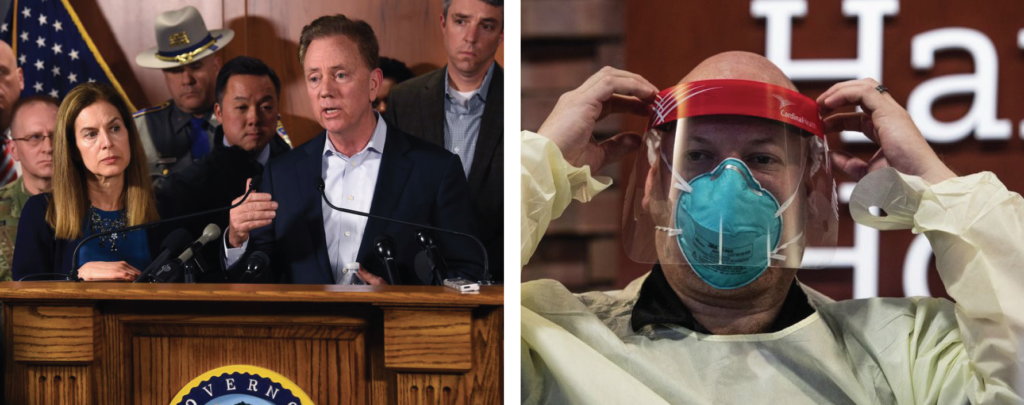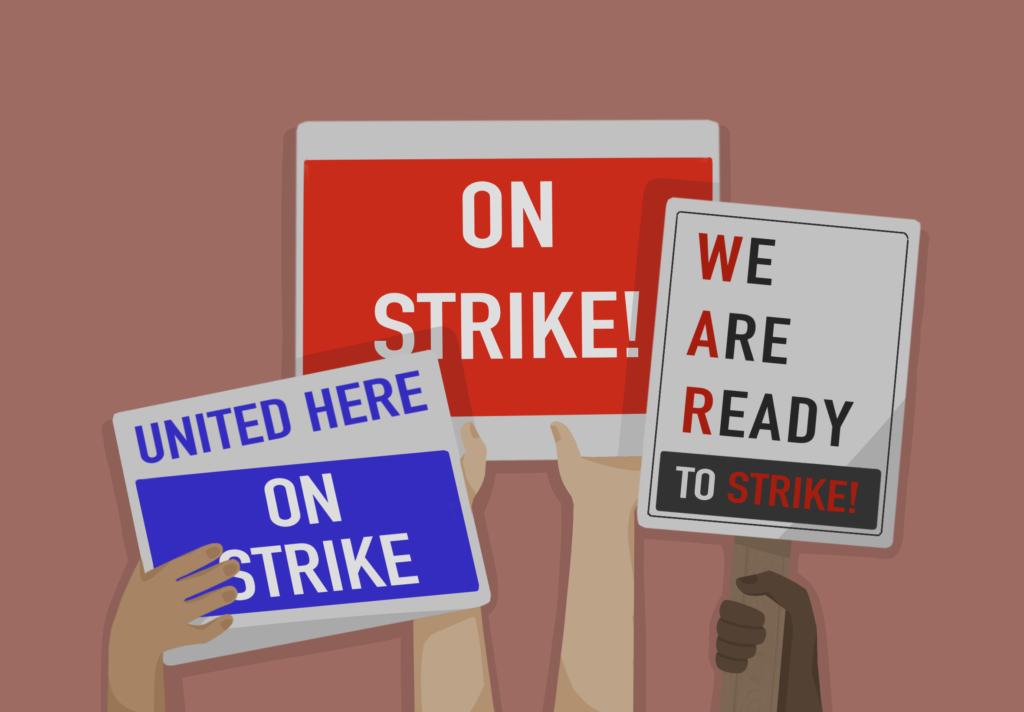
Gov. Ned Lamont speaks in response to COVID-19 public health concerns, and a local health care worker adjusts his mask at Hartford Hospital. Photos courtesy of Hartford Courant
The streets of Connecticut stay empty as silence falls over the once busy schools, shops, and restaurants. In just over a month since the state’s first confirmed case of the novel coronavirus (COVID-19), on March 8, Connecticut now has more than 50,143 cases and 868 deaths. On the frontlines and behind the scenes, government officials and healthcare employees have been working diligently to tackle the spreading pandemic.
In many healthcare settings, including hospitals, nursing homes, clinics, and doctors’ offices, personal protective equipment (PPE) shortages have left workers scrambling to find masks and gloves, along with other necessary medical equipment such as ventilators and beds. “The unpredictability of the virus makes it more challenging because we don’t know the overall number of patients we will get and when we will get them and if we will get a surge,” the University of Connecticut Health Epidemiologist Dr. David Branch told the Hartford Courant.
From creating homemade masks to implementing new policies for the reuse of supplies, medical workers have been coming up with innovative ways to make up for the shortages. In response to staff shortages, retired healthcare workers have re-entered the workforce and the process for healthcare worker certifications has been sped up. Meanwhile, venues like the O’Neill Center in Danbury have been converted into makeshift hospitals.
Aiming to prevent further spread of the virus, the government has been focused on promoting social distancing. On March 16, Connecticut officially banned gatherings of more than 50 people, and many cities have since banned gatherings of more than five. As a result, recreational centers such as movie theaters have closed and dining options at bars and restaurants have been limited to take-out and delivery only. All non-essential businesses and not-for-profit organizations have been closed since March 23 after Governor Ned Lamont passed his “Stay Safe, Stay Home” executive order. Essential industries including healthcare, construction, and food supply will continue to operate, but citizens have been advised to leave their houses only for emergencies
In an official statement, Governor Lamont said, “I know that this will be disruptive to many and will bring many daily activities to a halt, but the only way we will be able to mitigate the impacts of this public health emergency is to take measures like this.” Workers in these industries will instead work from home, and businesses that violate the policy may be subject to fines.
The closure of small, “non-essential” businesses and the rising unemployment rate have raised many concerns for Connecticut citizens. “First and foremost, [the government] has tried to make sure that every state program has a relation to a safety net in particular unemployment benefits,” said Connecticut Department of Economic and Community Development Commissioner David Lehman. “My biggest concern is that this public health crisis goes on for longer than folks expect, and the economy cannot restart because of that.”
In order to minimize the effects the coronavirus pandemic will have on the economy, programs have been launched at various levels of government. Locally, Wallingford Center Inc. and the Economic Development Commission are sponsoring a “Eat Local and Win” event through May 8 to encourage customers to order from local restaurants. Small businesses can be eligible for federally guaranteed loans through the Paycheck Protection Program (PPP) in order to sustain their employees. On a state level, the Connecticut Recovery Bridge Loan Program was created to help small businesses and nonprofits with their operational costs, giving them the opportunity to take out an interest-free loan of up to $75,000. In addition to small business assistance, the state will be implementing grace periods for taxes, mortgages, and loans. With Mr. Lamont’s request for a Major Disaster Declaration, the Federal Emergency Management Agency (FEMA) will provide unemployment assistance and food benefits along with a 75% reimbursement on costs used to combat the coronavirus.
The State of Connecticut continues to encourage its citizens to do everything they can in order to fight this pandemic whether it be tending to patients or self-isolating at home. “We are going to get through this,” said Mr. Lehman.




